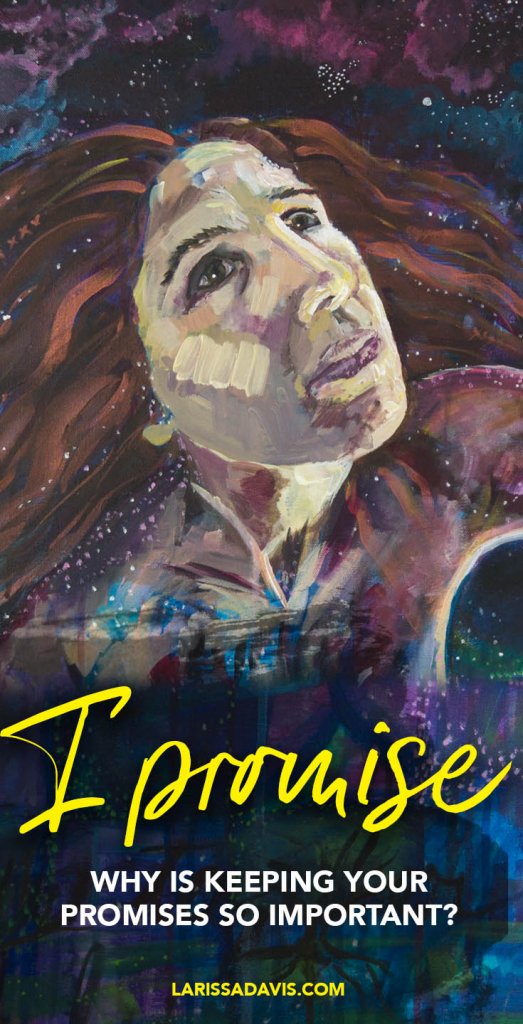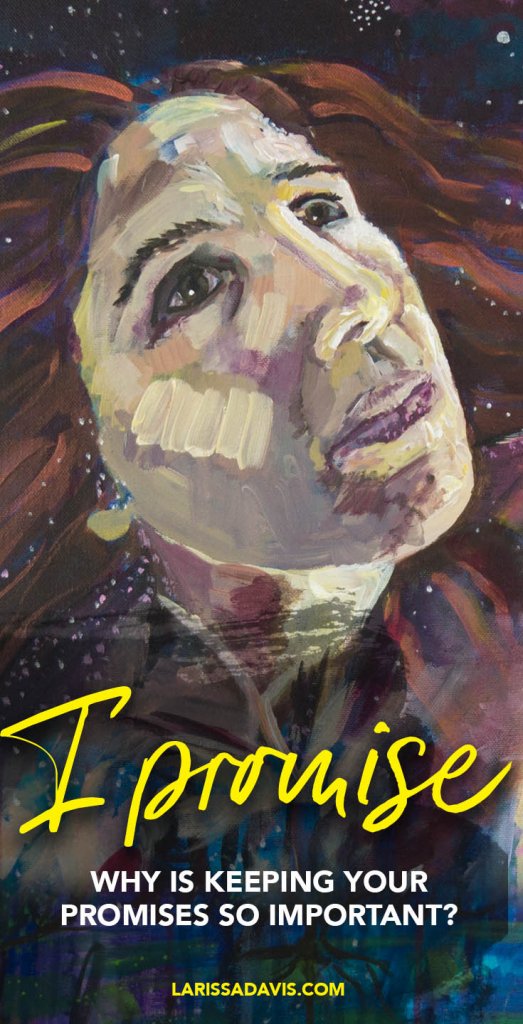Keep Your Promises
THE IMPORTANCE OF HONESTY in BECOMING WHO YOU TRULY ARE
At the beginning of The Four Agreements, author Don Miguel Ruiz talks about the agreements we make throughout our life, from the time we are born, which form our understanding of the world we live in. You may be more familiar with these as agreements as “limiting beliefs.” Here’s what Ruiz says:
“By using our attention we learned a whole reality, a whole dream. We learned how to behave in society: what to believe and what not to believe; what is acceptable and what is not acceptable; what is good and what is bad; what is beautiful and what is ugly; what is right and what is wrong. It was all there already — all that knowledge, all those rules and concepts about how to behave in the world.”
By making these agreements we learn the rules of our family, school, religion, society, country, and world. These agreements form our ideas about who we are, how we are supposed to act, what we are supposed to be, do, and even express. Ruiz calls this process of learning the rules of our world as “domestication.” I like how this term calls to mind a wild animal that trades her freedom for the comforts and security of food and a place to sleep. In exchange for a place in the world we give up our freedom and limit our self-expression.
The truth will set you free
In “The Four Agreements” Ruiz shares the four steps you must take if you want to free yourself from the limitations of domestication. Why would you want to do this? Well, because until you do, you will never know who you truly are or what you really want in life. You will be stuck in a cycle of judgment of yourself and others that limits your compassion. You will be living according to rules that come from outside of you rather than from your inner guidance. Every urge to express yourself will be judged and scrutinized by the part of you that follows the rules of domestication. Ruiz calls this the judge. I think of it as the inner critic. And the other part of you, the part that is judged? Ruiz calls this the “victim.” I think of this part as the wounded child.
The power of your word
I am going to tell you about the first agreement, which Ruiz says is the most important. To be free, Ruiz says, you must first agree to be impeccable with your word.
Your word is powerful. It has the power to create, to motivate, to destroy, to inspire, to heal. Have you ever said something and then seen the changes that unfolded? If you have, you know what I am talking about. Your word is your power. As Sara Barrielles says in her popular song Brave:
“You can be amazing, you can turn a phrase into a weapon or a drug.”
So your word has power...but what does it mean to be impeccable with your word? What is impeccability? I have always thought of it as perfection, faultlessness, and acting with the highest standards. The theological definition stems from the Latin word “impeccabilis” which means “without sin”. Here is what Ruiz says about sin:
“Religions talk about sin and sinners, but let’s understand what it really means to sin. A sin is anything that you do which goes against yourself. Everything you feel or believe or say that goes against yourself is a sin. You go against yourself when you judge or blame yourself for anything. Being without sin is exactly the opposite. Being impeccable is not going against yourself. When you are impeccable, you take responsibility for your actions, but you do not judge or blame yourself…Sin begins with rejection of yourself. Self-rejection is the biggest sin that you commit.”
Ruiz goes on to explain that even if we criticize another person, that is a “sin against ourselves” because that criticism causes a negative reaction in that person against you. Sound much like karma? Law of attraction? I think so, too.
This got me thinking about the advice I heard a year ago never to say anything that is not true. Maybe you have heard this advice, too. Maybe you have tried to follow it. I did. Yet, I can think of a number of things I said I would do and have not; promises I have not kept to myself and sometimes to others. We don’t like to think about an unkept promise as a lie, but it is. It is a sin against yourself. Lying to yourself and others like this becomes a habit that does not have quick fix, at least not in my experience.
Omitting the truth
The HBO series Chernobyl is a sobering depiction of the April 1986 disaster at the Chernobyl nuclear power plant in Soviet Ukraine. The cause was partly human error at the facility. But the nail in the coffin was a known fault with the reactor’s fail-safe “kill” switch. The man who discovered this fault published a report about it. He was sent away, never to be heard from again. The pages in the report discussing the fault were redacted. The truth was buried because the Soviet government was more concerned about keeping up its image as a superpower and leader in nuclear technology. This sin of omission was, ultimately, a sin against itself resulting in the disaster that killed thousands of its citizens.
Lessons from the U.S.S.R.
In 1986 I was 18, ever ignorant of goings-on in the world and struggling with my own angst and issues, I did not pay attention to the Chernobyl disaster. It seemed a world away. But I was very aware of Soviet leader Mikhail Gorbachev’s promotion of perestroika and glasnost (openness) which marked the beginning of the end of the Cold War which had cast the threat of global destruction over my entire life. This turn of events took a huge weight off my heart and mind as that ever-present fear lifted. I felt hope and optimism about life and the future. I wanted to be part of this moment in history and do my part to heal the broken relationship with our sister superpower.
This is why, in 1988, I began studying Russian. I was a quick study with an uncanny ability for sounding like a native Russian. In 1989 I was part of an exchange program with the USSR. The 20 students I traveled with felt the same drive to be part of this new relationship with the USSR. We exchange took us to Soviet Ukraine for two weeks. We were in Kharkiv, 276 miles from Chernobyl. But three days were spent in the beautiful city of Kiev. Kiev is just 58 miles from Chernobyl, downstream on the Dnieper river, Ukraine’s main water source. 58 miles. On a highway, you could drive there in about an hour. Think about a town or city just 58 miles from you. It is close, right? Almost ridiculously close. Too close. But I wanted to go, and I chose to remain blissfully ignorant of how close I was to Chernobyl and the possible consequences of being there.
The truth will out
While in Kiev, walking down a beautiful avenue along the river, every 20-50 feet I saw a dead pigeon. I knew those dead birds were not a good sign. I wanted to ignore them, forget about them. And so I did, for all these years. Just as the Soviets in charge of the report that found the fault with the kill switch buried that information, I buried that memory. But more than 30 years later, in my living room, a scene in the series brought it all back. I don’t know how they filmed it, but they showed a bird expiring, falling dead on the ground, just like those pigeons.
I am not saying I was exposed to enough radiation to do much damage. I don’t know enough to say that. But there is no doubt that for those two weeks I was living, eating, drinking, and breathing the radiation of Chernobyl. I am not going to worry about it. But I am also not going to pretend it did not happen. Not anymore.
The truth will out. I believe that, and I thank God it does. Holding falsehoods and lies takes energy. It saps strength, it weakens us. Trying to maintain a façade of strength and power, like the USSR did in 1986, is a dream…another “agreement” that is not true. Lies like this comes from fear, from weakness. The real sign of strength is when we face the truth, deal with it, and heal. There is no healing until we become impeccable with our word. Until we make and keep that first agreement, we are just compounding our lies…burying ourselves more and more deeply under the limitations of the lies and broken promises with which we have imprisoned ourselves.
The importance of keeping your promises
When I think about how all of this pertains to my life beyond Chernobyl, I see that not only are there the countless agreements I have made unconsciously in the form of limiting beliefs and judgments, there are promises I made to myself and others that I never kept.
We all do this. Think about something you promised yourself. Like, maybe you told yourself you would not have dessert today, but you did. Or maybe you made a resolution to lose 50 pounds, or join the gym, or start painting again. Have you kept them?
And what about promises you have made to others? Can you think of a promise you made, knowing at the time you would not follow through? Promises you made because you judged that they were necessary? Or promises you made because the judge in you told you it was the right thing to do? I am not saying you need to keep promises that go against yourself, but I am saying that you need to think before you make those promises. When you say we will do something, it needs to be the truth.
Maybe, like the Soviets, you told lies or hid the truth about yourself to save face. I did this for years in my corporate job. I lied to myself and to those I worked with. My “judge” told me the job was good, the career was good, I was successful, I needed the job. My victim followed the orders of the judge. Every day that I went to work feeling anxiety and dread I pushed the feelings away. I buried the truth, just like the truth about the Chernobyl reactors was buried. Every review at work where I pretended to be enthusiastic I was lying to myself and my supervisor. I did this to keep up appearances. To save face. So much easier, it seemed, than admitting the truth that I was unhappy and doing something about it.
Being a creative goddess, however, means keeping those promises you make to yourself and others. It means telling the truth no matter what your “judge” says. It means standing up for your victim and rescuing your wounded child. We are complex, we humans. And all of these characters I am describing are aspects of our personalities that play a part in how we live our lives. Being a creative goddess means putting the powerful, resourceful, creative, brave, loving, passionate, wise, ecstatic part of yourself in control. She is your truthometer. She will never steer you wrong.



